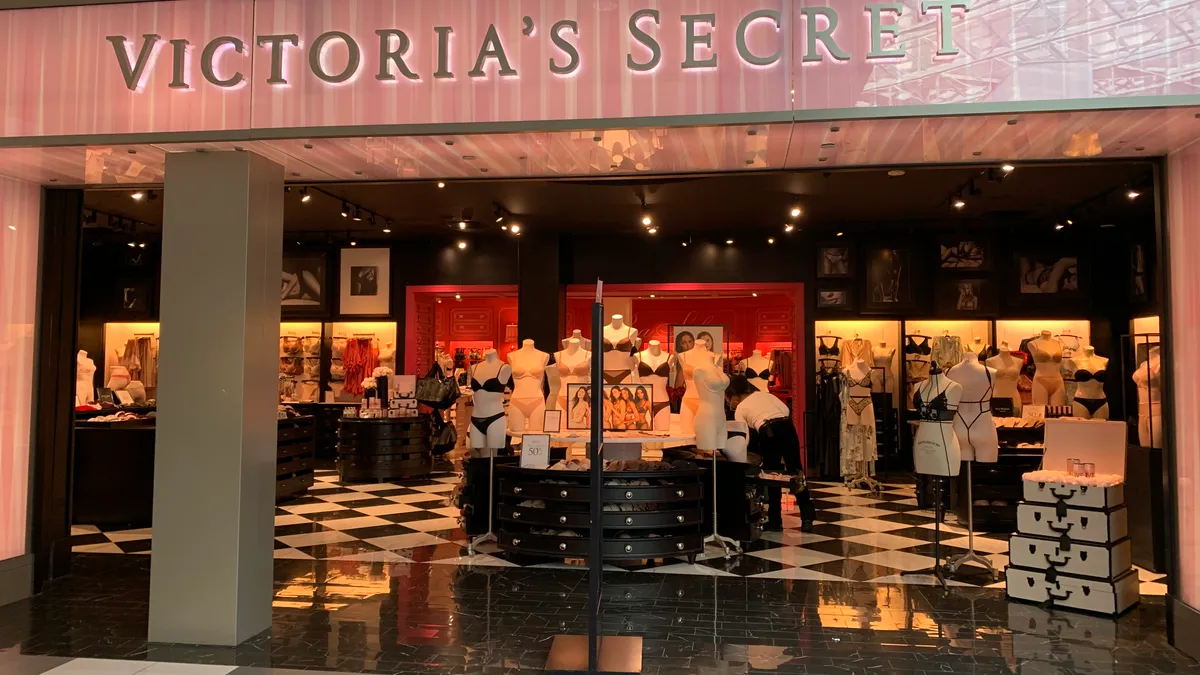Dive Brief:
- As L Brands again looks to potentially sell Victoria's Secret, the banner could fetch a higher sale price than in last year's failed deal with Sycamore Partners.
- The lingerie chain's parent, L Brands, has been back in talks with prospective buyers and is now eyeing a valuation of $2 billion to $3 billion for Victoria's Secret, Bloomberg reported Thursday.
- "As a result of the substantial improvement in performance at Victoria's Secret, various sellside analysts have valued the Victoria's Secret business at as much as $5 billion," CFO Stuart Burgdoerfer said in a statement emailed to Retail Dive and other media. "The Board and our management team continue to evaluate both a potential spin-off of the Victoria's Secret business into a separate public company and a sale of the business."
Dive Insight:
In last year's terminated deal with Sycamore Partners, L Brands agreed to sell a 55% stake in Victoria's Secret to the private equity firm for $525 million in a transaction that valued Victoria's Secret at $1.1 billion. When L Brands announced the acquisition last February, the retailer called it a "transformative transaction."
The sale would have left L Brands with a 45% stake in the lingerie giant after years of trying to manage a decline of the banner. In the years leading up to the deal, Victoria's Secret continually stumbled as competitors multiplied and the brand's trademark marketing style and runway shows — all highly sexualized — ran into changing attitudes and the #MeToo era.
Those issues were magnified by L Brands founder Lex Wexner's longstanding financial and personal relationship with Jeffrey Epstein, who was charged with sex trafficking. Epstein's death while awaiting trail was ruled a suicide.
Wexner's fate at L Brands was tied up with the Sycamore deal. On its announcement, the company said that Wexner would step down as chairman and CEO once the deal closed.
The deal never closed. It was announced on Feb. 20, 2020. Within a month, the entire retail and financial world upended with the spread of COVID-19 in the U.S. L Brands, along with most other major discretionary retailers, shuttered its stores to combat the spread of the new coronavirus. It also furloughed most of its employees, drew down its revolver and took numerous other steps to preserve liquidity and wait out the pandemic and stay-at-home orders.
By April, Sycamore looked to back out of the deal. The private equity firm, no stranger to retail, called the store closures and staff layoffs a violation of their sale agreement. The retailer and financial firm traded words and legal action, before mutually agreeing to call off their deal by May.
While the deal didn't happen, the company moved forward with Wexner's transition from CEO and Chairman to a less-involved role. In March, the company signaled that Wexner would be leaving the board entirely.
As the pandemic wore on last year, the sales drop-off and cash crunch raised the financial risks for L Brands, as it did for many mall-based and apparel retailers. (The company appeared on Retail Dive's bankruptcy watch list in October, based on ratings from CreditRiskMonitor.)
The retailer is now seeing a rebound. Foot traffic increases lifted the sales of both of L Brands' signature banners, Victoria's Secret and Bath & Body Works, the latter a typically strong performer. In March the company raised its guidance for the year, citing revenue increases thanks to federal stimulus and the easing of pandemic restrictions in some areas.
The sale of Victoria's Secret, or a major stake in the banner, could give L Brands a further financial boost. The company indicated last year it intended to move forward with separating Victoria's Secret in some fashion.
In February, the company announced Martin Waters, then CEO of Victoria's Secret Lingerie, as the new CEO of the Victoria's Secret business. In the same press release, L Brands said it was targeting August 2021 for a separation of Victoria's Secret, with all options — including a spin-off IPO of Victoria's Secret or a private sale — on the table.
















